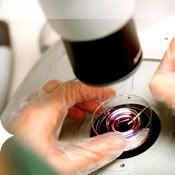Stem Cell Research Up In Senate This Week
 Setting up the next veto battle with George W. Bush, the U.S. Senate yesterday began debating two competing stem-cell bills, one which passed the House of Representatives in January -- and that Bush has pledged to veto -- and another, GOP-sponsored bill put forth under the guise of compromise legislation.
Setting up the next veto battle with George W. Bush, the U.S. Senate yesterday began debating two competing stem-cell bills, one which passed the House of Representatives in January -- and that Bush has pledged to veto -- and another, GOP-sponsored bill put forth under the guise of compromise legislation.S. 5, the Stem Cell Research Enhancement Act of 2007, sponsored by Senate Majority Leader Harry Reid (D-NV), and cosponsored by 39 other Senators, including six Republicans, would lift Bush's 2001 ban on federal funding for any new embryonic stem cell studies.
"Democrats and Republicans joined together last year to pass legislation that would have made more stem cell lines available to scientists, while at the same time strictly regulating how they could be used," said Reid on Tuesday. "The actions of the Senate and the House gave hope to the 100 million Americans and tens of thousands of Nevadans who suffer from cancer, Alzheimer's Diabetes, Parkinson's, spinal cord injuries, heart disease and ALS."
"Sadly, President Bush vetoed that bipartisan bill - and as a result, we must take on this urgent cause once again. This week, we will debate the Stem Cell Research Enhancement Act and we will fight to see that it becomes law."
And the White House made it clear on Tuesday that the same thing will happen this time.
"There are two -- there are several bills moving through Congress, but there are two that are going to be debated on the floor this week," said Bush press secretary Dana Perino. "One the President said that he strongly supports and could sign, and the other one is similar to one that he vetoed before and he would veto again if it were to pass."
The Religious-Right-Friendly bill that Bush would be OK with -- the president consults with religious leaders on stem cell science -- is sponsored by Senator Norm Coleman (R-MN) and is called the Hope Offered through Principled and Ethical Stem Cell Research Act (S. 30). It has only one cosponsor and would direct taxpayer money to stem cell research on fertilized embryos that have passed the window of time in which they are capable of developing into a human being.
"S. 30 puts all its hopes in theories - alternative ways of deriving stem cells that might work, or they might not. At this point, no one knows," said Tom Harkin (D-IA) in arguing against the Republican alternative. "S. 30 tells scientists: Don't use any of the 400 existing stem cell lines that have already been derived. Instead, put all your effort into figuring out some new way of deriving stem cells that might take 10 years to pan out, or not at all."
"S. 5, by contrast, would immediately make those hundreds of new lines eligible for federal research, as long as they were derived under the bill's strict ethical guidelines. So S. 30 might not do any harm. But it doesn't do any good, either. And that's just one more reason why we need to keep our focus on S. 5."
Freshman Senator Ben Cardin (D-MD) said that Bush should not let his personal ideology stand in the way of U.S. progress in science and medicine.
"Rarely does this body have a chance to cast a single vote that can offer so much hope to millions," said Cardin. "I believe that it is wrong for the President of the United States to tie the hands of our scientists while millions of Americans suffer from diseases that stem cells have the potential to treat."
Senator Bob Menendez (D-NJ) was even more harsh, saying on the Senate floor yesterday that Bush's anti-science policies are keeping Americans sick who might otherwise have hope for a cure.
"It is time for the President to start listening to the American people and to the scientists, not just special interests," Menendez said. "It's time for him to sign this important piece of legislation into law and open the door to the hope and promise of embryonic stem cell research."
"Why is he standing in the way of research that will save lives?" Menendez continued. Why is he keeping our parents, our children and our friends locked in wheelchairs and hospital beds? Why is he letting conservative ideology rob the lives of so many suffering Americans?"
But Menendez should remember that this is the same president who sleeps just fine at night knowing he is condemning more American troops to die for nothing in Iraq -- so why should the deaths (from disease) of Americans at home bother him?
Harkin tied it all up nicely by pointing out how ludicrous it is that, in what's supposed to be one of the most scientifically advanced countries in the world, moving forward with stem cell research is even still in question.
"Most Americans probably find it hard to believe we're still arguing about this issue. They understand the power of stem cell research. They've listened to the scientists. They watched the House and Senate vote overwhelmingly during the last Congress to expand the Administration's policy. Then they went to the polls in November, and more often than not, elected candidates who support stem cell research. So why are we still debating this?" said Harkin.
"The answer, unfortunately, is simple. President Bush used the first and, so far, only veto of his administration to reject last year's stem cell bill and dash the hopes of millions of Americans. So we're back here once again."

















<< Home